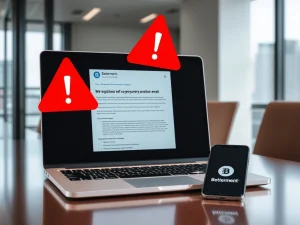Urgent Breakthrough: Data Sharing Redefines Crypto Compliance

The cryptocurrency industry is rapidly evolving. However, a significant challenge persists: combating widespread fraud and ensuring robust crypto compliance. Scams are reaching unprecedented levels, and regulators are increasing scrutiny. Industry leaders now recognize that individual efforts alone cannot solve these complex issues. Instead, a bolder, more collaborative approach is essential for the sector’s long-term health and credibility. This involves embracing cross-sector data sharing as the next crucial frontier in financial crime prevention.
The Escalating Crisis of Crypto Fraud
The digital asset landscape faces an alarming rise in criminal activity. Reports indicate that cryptocurrency scams hit a staggering $9.9 billion in 2024. Projections for 2025 suggest an even bleaker outlook. These fraudulent schemes often combine traditional tactics, like Ponzi and pump-and-dump operations, with new crypto-specific typologies such as address poisoning. Such pervasive fraud severely undermines consumer confidence. Moreover, criminals increasingly exploit the crypto sector to launder proceeds from traditional finance (TradFi) fraud. This creates significant AML checks challenges for firms. For example, nearly 90% of UK crypto registration applications fail due to inadequate Anti-Money Laundering (AML) and fraud controls. The industry must confront this reality directly.
Why Isolated Efforts Fall Short in Digital Assets
The abuse of the digital assets sector has not gone unnoticed. The industry actively works to improve its image in the eyes of global regulators. Many authorities now look to regulate the sector beyond just the AML perimeter. While individual firms have launched commendable initiatives, such as scam flagging tools and disruption operations, these efforts often have limited impact in isolation. They resemble isolated islands in a vast ocean. A more unified strategy is clearly needed. The industry requires a much bolder approach to anti-financial crime data sharing. This collaborative method has already become standard practice in the TradFi sector.
Consider the successful models in traditional finance:
- Singapore mandates anti-scam data sharing between financial services and telecommunication companies.
- Australia and the UK operate industry-led voluntary schemes.
Globally, data sharing is now accepted as a key defense against fraud. We can only significantly impact this global crime wave by connecting the dots along the entire fraud value chain. As fraud adapts to the new international financial landscape, the digital assets community remains a missing link. Integrating this community into existing data-sharing efforts will strengthen the entire ecosystem. It will also bring substantial benefits directly to the industry itself.
Critical Intervention Points for Enhanced Crypto Compliance
Implementing effective crypto compliance through data sharing requires focusing on specific intervention points. Mike Haley, CEO of Cifas, outlines three key areas where the industry must act decisively:
- On-Ramping and Off-Ramping: Crypto’s current limited use as a mainstream payment medium means even dedicated crypto criminals cannot operate in isolation. The conversion points between crypto and fiat currencies are crucial. Neither side currently sees the full picture. A failure to share data at these junctures severely impedes anti-fraud efforts. Sharing data here is paramount.
- Combating Fraud Proceeds Laundering: The use of crypto in the fraud laundering chain poses a significant AML challenge. Regulators are increasingly cracking down on exchanges, and new rules are beginning to take effect. The industry must build robust defenses against the laundering of fraud proceeds. This is impossible without essential data flows. These flows are necessary to identify and block individuals from entering their ecosystem. The required data must be sourced from further up the value chain.
- Leveraging Established Expertise: While the digital assets community shows growing willingness to tackle fraud, compliance remains a nascent discipline within the sector. The industry would greatly benefit from hard data and the extensive experience of established fraud prevention specialists. These experts work across other sectors. For them, many emerging crypto frauds are simply “business as usual.” Their insights are invaluable.
The arguments for cross-industry data sharing to prevent crypto-linked fraud are compelling. The next step involves translating this theory into actionable strategies.
The UK: A Catalyst for Data Sharing and AML Checks
The United Kingdom presents a particularly favorable environment for the crypto industry’s initial ventures into cross-sector data sharing. From a legal standpoint, the UK privacy regulator, the Information Commissioner’s Office (ICO), has clearly stated, “data protection is not an excuse when tackling fraud and scams.” This statement holds significant relevance for recent crimes, such as a $1.2 million scam where fraudsters impersonated law enforcement and crypto wallet hosts. They tricked victims into revealing personal information. This clear stance, coupled with recent legislative changes like the Data (Use and Access) Act 2025, strengthens the legal argument. This Act establishes crime prevention as a “recognized legitimate interest” for data sharing. Therefore, the legal foundation for sharing data could not be clearer.
Furthermore, the UK’s regulatory horizon for digital assets offers both incentives and pressures for fraud prevention and data sharing. The UK Chancellor’s recent announcement on future regulation strongly suggests that the digital assets industry will be subject to the same consumer protection rules as the TradFi sector. It is difficult to imagine effective UK consumer protection against fraud without a cross-industry data-sharing component. The Financial Conduct Authority (FCA), slated to be the future digital asset regulator, has also highlighted data sharing as a key tool. They see it as crucial in the fight against fraud proceeds laundering. This serves as a significant carrot for proactive industry engagement.
Accelerating Collaboration for Robust Crypto Compliance
Finally, the UK boasts a rich and established financial crime data-sharing ecosystem. This includes robust public-private, intra-industry, and cross-sector collaborations. A prime example is the Joint Money Laundering Intelligence Taskforce (JMLIT). Initiatives like these have already begun opening their doors to the digital assets industry. With additional government and regulatory backing, this integration could accelerate significantly. The crypto and digital asset community is acutely aware of the reputational and regulatory risks posed by the current fraud emergency. However, mere recognition is insufficient. Efforts must not remain siloed. Cross-industry data sharing is a key enabler of effective fraud prevention worldwide. Given the UK’s uniquely conducive environment, it is exceptionally well-placed to lead by example in this critical area.
Opinion by: Mike Haley, CEO of Cifas. This article is for general information purposes and is not intended to be and should not be taken as legal or investment advice. The views, thoughts, and opinions expressed here are the author’s alone and do not necessarily reflect or represent the views and opinions of Crypto News Insights.









